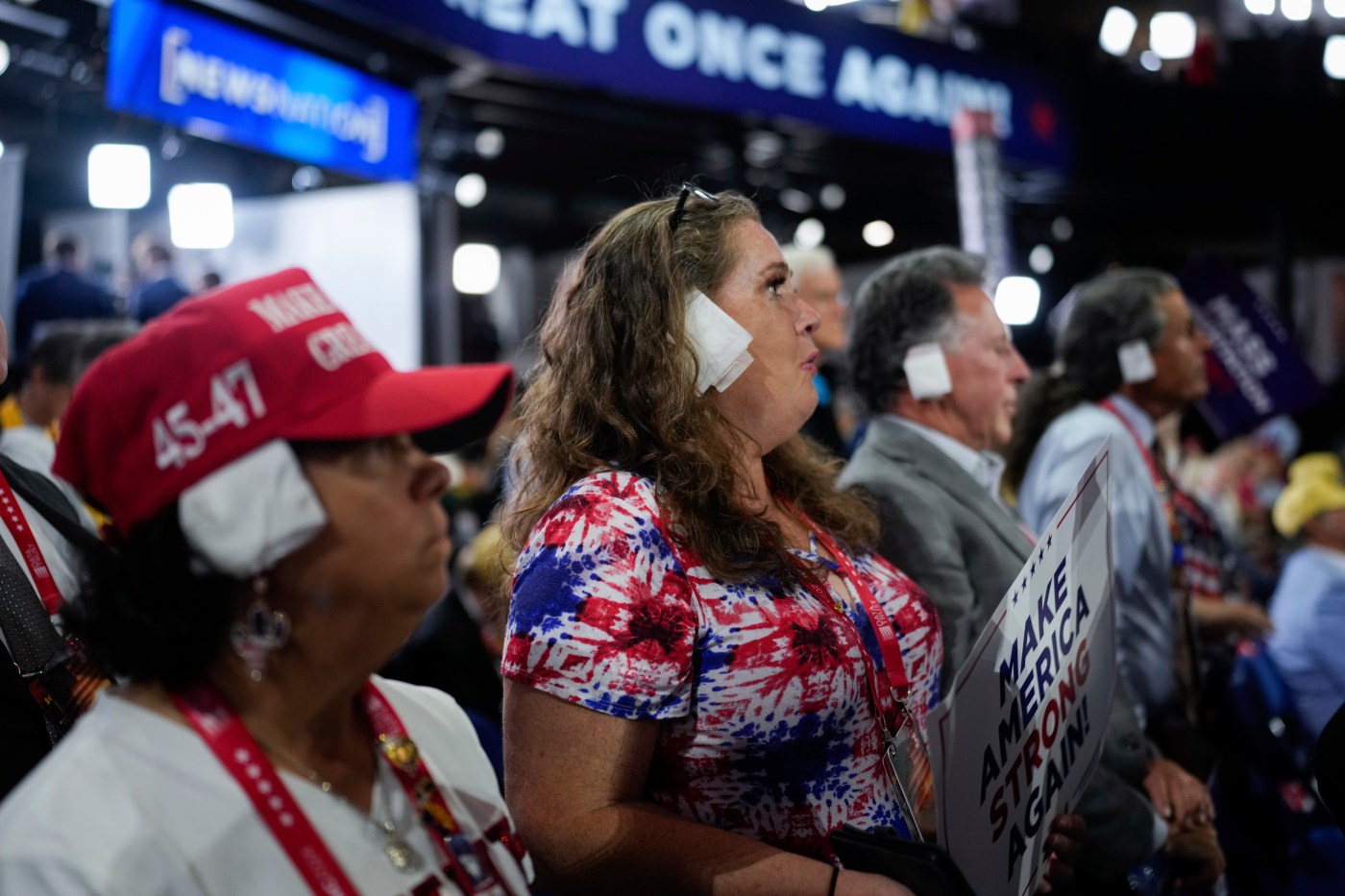
David French: Works of fiction from the Republican convention
I watched hour upon hour of the Republican National Convention, something I’ve done every four years since I was a young political nerd in 1984. I was even a Mitt Romney delegate at the Republican convention in 2012, and this was the first that was centered entirely on a fundamentally false premise: that in our troubled time, Donald Trump would be a source of order and stability.
To bolster their case, Republicans misled America. Speaker after speaker repeated the claim that America was safer and the world was more secure when Trump was president. But we can look at Trump’s record and see the truth. America was more dangerous and the world was quite chaotic during Trump’s term. Our enemies were not intimidated by Trump. In fact, Russia improved its strategic position during his time in office.
If past performance is any indicator of future results, Americans should brace themselves for more chaos if Trump wins.
The most egregious example of Republican deception centered on crime. The theme of the second night of the convention was “Make America Safe Again.” Yet, the public mustn’t forget that the murder rate skyrocketed under Trump. According to the Pew Research Center, “The year-over-year increase in the U.S. murder rate in 2020 was the largest since at least 1905 — and possibly ever.”
That’s a human catastrophe, and it’s one that occurred on Trump’s watch. Republicans want to erase 2020 from the American mind, but we judge presidents on how they handle crises. Trump shouldn’t escape accountability for the collapse in public safety at the height of the pandemic. And although we can’t blame Trump for the riots that erupted in American cities over the summer of 2020, it’s hard to claim he’s the candidate of calm when he instigated a riot of his own on Jan. 6, 2021.
It’s particularly rich for Trump to claim to be the candidate of order when the crime rate rose during his presidency and is plunging during Joe Biden’s. In 2023, there was a record decrease in the murder rate, and violent crime, ABC News reported, “plummeted to one of the lowest levels in 50 years.”
Trump’s argument about foreign policy is also fundamentally deceptive. Throughout the convention, we heard variations of the same theme: Russia didn’t invade any other country under Trump, and Iran was broke and powerless. But again, this is misleading. Far from being frightened and intimidated by Trump, Russia and Iran directly attacked U.S. troops when he was president.
In 2018, Russian mercenaries and their Syrian allies assaulted a U.S. position in northern Syria, leading to a four-hour battle during which U.S. forces deployed artillery and airstrikes to beat back the attack. In 2020, Iran fired a volley of ballistic missiles at U.S. troops in retaliation for our strike against Gen. Qassem Soleimani and injured more than 100 U.S. service members.
In both instances, our forces handled themselves with courage, professionalism and skill, but if Russia and Iran were so frightened of Trump, why did they attack Americans?
Iran was hardly quiet during Trump’s term. In 2019, it launched drones and missiles against Saudi Arabian oil facilities. The United States also claimed that Iran was responsible for sabotaging four oil tankers in May 2019. By that fall, the two countries were on the brink of war.
At the same time, Iran was ramping up its nuclear program. After Trump terminated the Obama-era Iran nuclear deal, Foreign Policy magazine’s Colum Lynch reported that Iran had “resumed its enrichment of uranium, restarted research and development on advanced centrifuges and expanded its stockpile of nuclear fuel, cutting in half the time it would need to produce enough weapons-grade fuel to build a nuclear bomb.”
Although Russian President Vladimir Putin didn’t invade any new countries while Trump was president, he did secure an important military victory: He achieved a strategic success by helping Syrian President Bashar Assad survive the Syrian civil war.
Even worse, Russia advanced at our expense. When Trump ordered a precipitous withdrawal from northern Syria, he not only abandoned our Kurdish allies, he also created an opening for Russia, and it filled the power vacuum immediately. Russians even filmed themselves occupying an abandoned American base.
The Syrian withdrawal caused Trump’s secretary of defense Jim Mattis to resign. His resignation letter made the reason clear. As Mattis wrote, his own “views on treating allies with respect and also being cleareyed about both malign actors and strategic competitors are strongly held and informed by over four decades of immersion in these issues.” Trump’s obvious disrespect for our allies harmed U.S. interests then, and if he wins they’ll harm U.S. interests again.
Even the Trump campaign’s best arguments are undermined by Trump’s own mistakes. The chaos of the U.S. retreat from Afghanistan was indefensible, the lowest moment of Biden’s presidency. And Republicans were right to hammer the Biden administration for its failures. But let’s not pretend for a moment that Trump acted more responsibly. In fact, he tried to withdraw even more quickly than Biden did, and Biden executed the withdrawal agreement that Trump negotiated. Yes, Biden executed the withdrawal badly, but it was a withdrawal that Trump wanted as well.
At the end of Trump’s term, Russia was stronger, Iran was unbowed, and the United States’ relationship with our key allies was more tenuous. Trump had even threatened to yank the United States out of NATO, our most important alliance, an act that would fulfill one of Putin’s fondest hopes.
No one should minimize the danger of the present moment. War is raging in Ukraine and in the Gaza Strip, but the United States’ enemies are taking catastrophic casualties, thanks, in large part, to steadfast U.S. support. The Russian army has suffered staggering losses, and much of its inventory of advanced weaponry has been destroyed. It’s rusting in the Ukrainian countryside.
Hamas’ surprise attack on Israel was a prelude to its ruin. Its military formations have been dismantled, even if not completely destroyed. If it can ultimately retain a foothold in Gaza, it will be years before it can rebuild even a small fraction of its prewar strength.
In many ways, the parties have switched roles — it’s the Democrats who are facing down Russian aggression, while it’s Republicans who’ve chosen to do exactly what former U.N. Ambassador Jeane Kirkpatrick accused “San Francisco Democrats” of doing during the Cold War — blaming the U.S. first. One convention speaker, tech entrepreneur David Sacks, explicitly claimed that Biden “provoked — yes, provoked — the Russians to invade Ukraine with talk of NATO expansion.”
Trump is hoping to win the presidency in part through appealing to so-called nostalgia voters, and so far, it seems to be working. Millions of Americans appear to have forgotten the bad times in Trump’s term or excuse his failures. It will be up to the Democrats to remind Americans of the aspects of the Trump years that they’ve blocked from their minds — a period that began with alarms about war with North Korea, included a war scare with Iran, and ended with Russia advancing as we retreated. It was a term that began with low crime rates and ended with the worst murder spike in generations and the Capitol under siege.
In the TV show “Ted Lasso,” the titular character — a folksy American football coach who manages an English professional soccer team — tells his team that goldfish have the shortest memories in the animal kingdom. “Be a goldfish,” he tells them, urging them to forget their mistakes, and play with confidence. Although a short memory can be a virtue in sports, it’s a terrible trap for voters. It makes you vulnerable to lies.
Trump wants you to be a goldfish. He wants you to empty your mind of the past so that he can fill it with his own “alternative facts.” The Republican National Convention was one long exercise in creating memories of a Trump term that never existed. The real Trump term was chaotic and dangerous from start to finish, and if Americans’ memories don’t improve soon, the voters who seek peace and stability will instead bring us violence and tears.
David French writes a column for the New York Times.
Related Articles
David Brooks: What Democrats need to do now
Sheldon Jacobson: What can the FAA and TSA do to handle spikes in flyers?
Tressie McMillan Cottom: The GOP looked youthful Wednesday night
E.J. Fagan: Despite Trump’s denials, he and Project 2025 are close
Noah Feldman: The Supreme Court’s religious crusade found its soldiers


